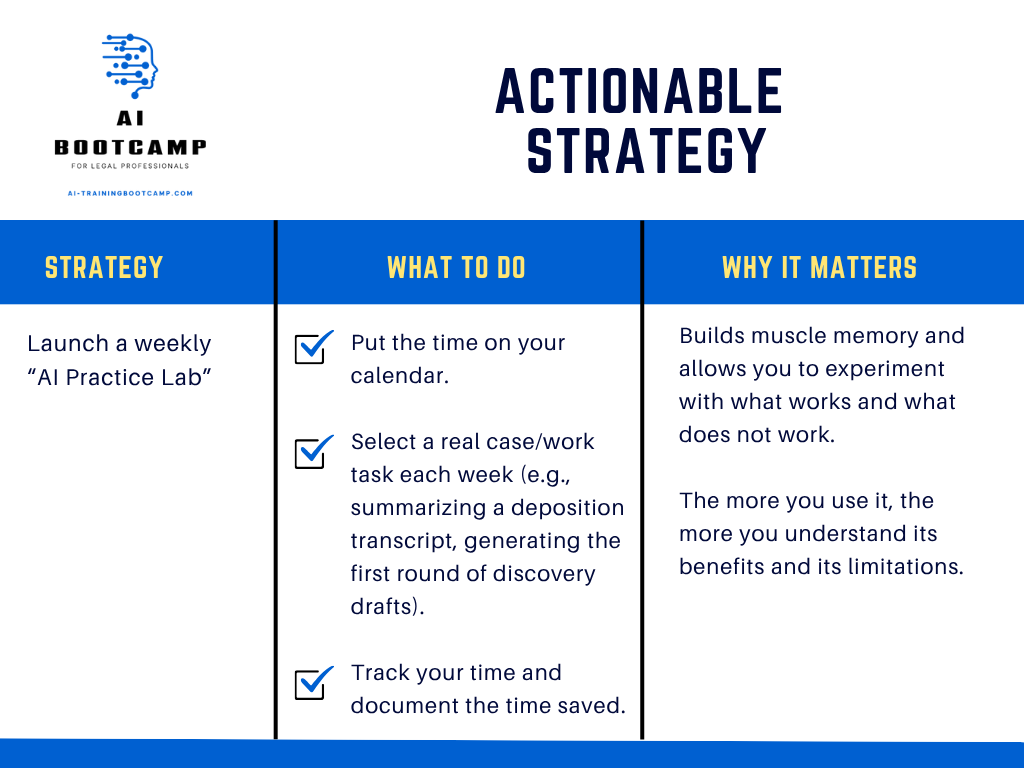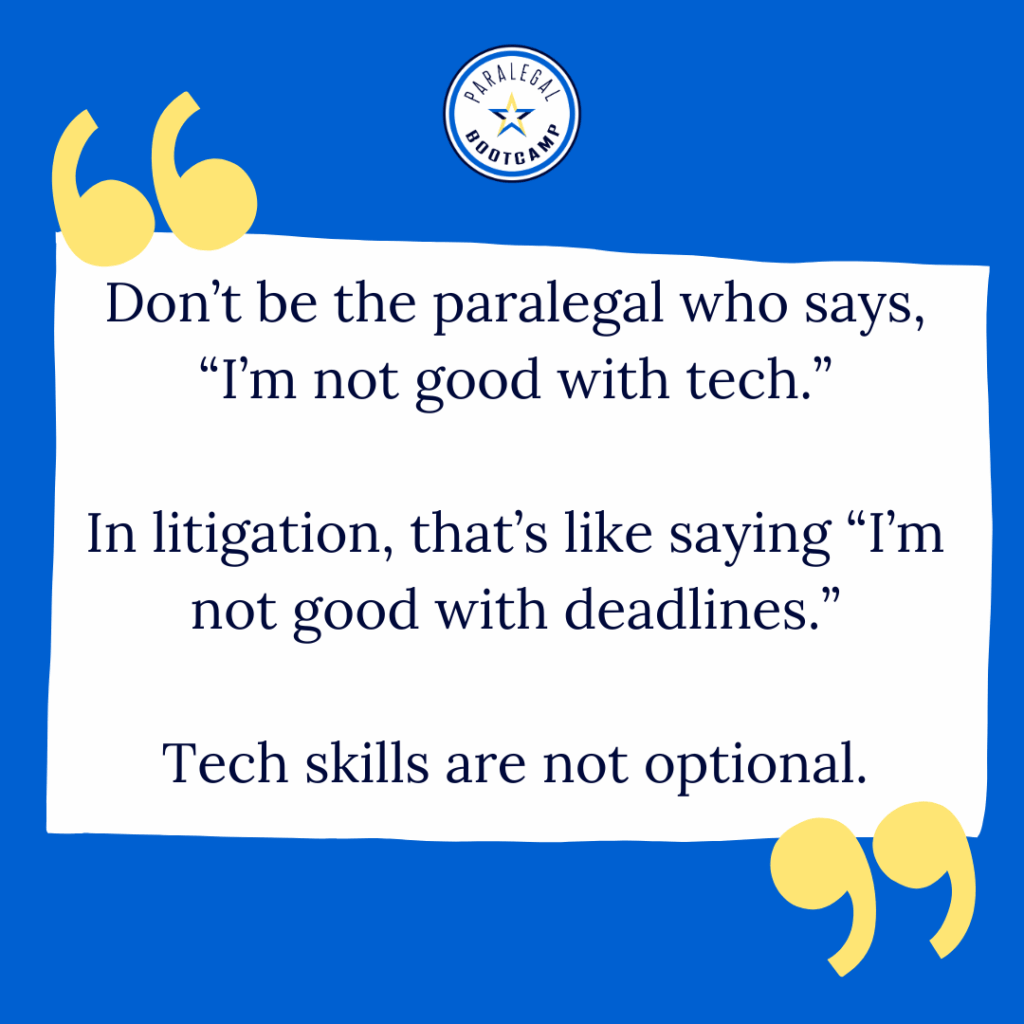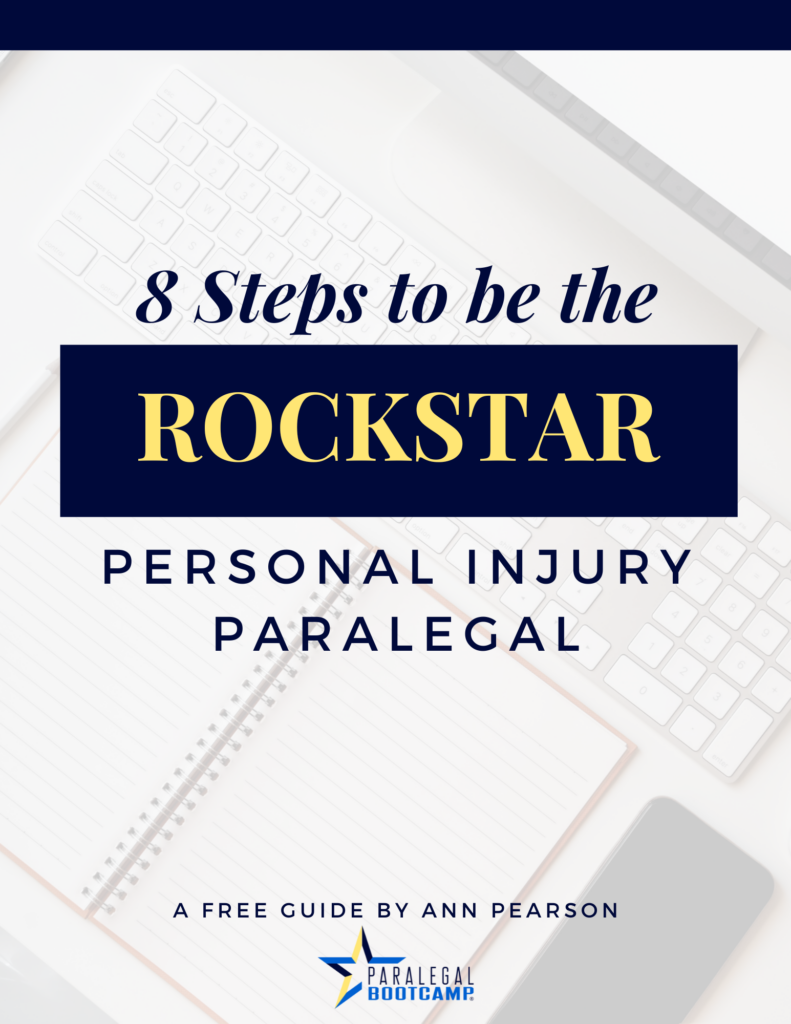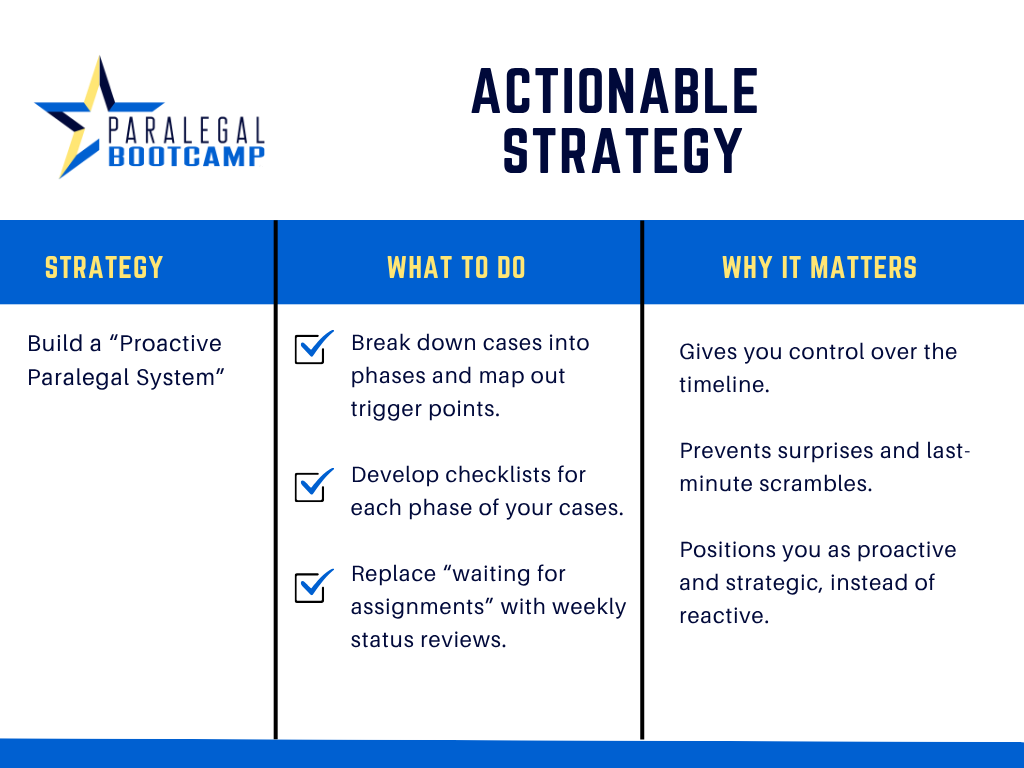If you’re serious about thriving in litigation, mastering the essential skills for litigation paralegals isn’t optional; it’s your career’s foundation.
From managing tight deadlines to coordinating discovery, technology, and trial prep, litigation paralegals are the key project managers of every case.
Whether you’re brand new to litigation or ready to level up your expertise, understanding these seven core skills will make you work smarter, anticipate your attorney’s needs, and allow you to be the go-to person every lawyer depends on.

Table of Contents
1. Paralegal AI Skills
Litigation paralegals who master AI aren’t chasing trends; they’re future-proofing their careers. AI isn’t optional anymore. It’s a core competency that raises your value, your efficiency, and your relevance as work shifts faster than ever.
If you’ve been a paralegal for a while, think back to the late 1990’s when the internet was becoming prominent. Okay, I’m about to date myself here, but it’s worth it to bring the point home for you if you’re not completely onboard with learning everything you can about AI.
Remember when the internet was the “next tech trend?”
In the late 1990s, there were lots of people who thought the internet was “just another tech trend” that was going to go away like other trends, so they focused on other skills. Hopefully, those paralegals were close to retirement at that time.
Remember when eDiscovery was the “next tech trend?”
The same thing happened in the next decade (around 2007 – 2010) with eDiscovery technology. I personally heard many litigation paralegals who said I only work with paper. Hopefully, those paralegals were close to retirement, because by 2015, eDiscovery was one of the required skills for litigation paralegals, unless you were limiting your employment to solo practitioners or small firms.
Don’t let this next tech trend get ahead of you.
Don’t let the same thing happen with your paralegal AI skills. Stay ahead of it. That’s why this is the number one skill on my list.
That’s not to say all of these skills for litigation paralegals are listed in the order of importance, but this one is. Prioritize this skill.
AI Skills for Litigation Paralegals – The Basics to Get Started

Awareness of the ABA Formal Opinion 512: what tools are okay, risk of confidentiality breaches, and verification of AI work. Watch the video on AI Ethics on our blog.

Trying out tools like NotebookLM (uploading depositions, transcripts, memos) to see what’s helpful vs. what slows you down. For example, I showed an interesting take on what NotebookLM did to a podcast episode in this video. Until you start experimenting with the tools, you won’t know how they can help you in your daily work.


Leadership in AI adoption: You don’t have to be the expert at AI; you just need to start learning.
Here is the best 40 minutes you can invest in your career this month! It’s our 3 Steps to Future-Proof Your Paralegal Career Against AI.
Actionable Strategy For You
If you are not yet comfortable using AI, try this actionable strategy to get started. Just like all of your other software tools and technology, the more you use it, the more comfortable you are using it.

If you’re ready to go beyond dabbling and actually implement AI in your daily work, join us inside the AI Boot Camp for Legal Professionals.
You’ll not only get step-by-step training on how to use AI tools safely and effectively, but you’ll also join a community of paralegals, attorneys, and others who are sharing real examples of how they’re using AI to work smarter. During our live group coaching calls, we collaborate, troubleshoot, and learn from one another.
2. eDiscovery Skills for Litigation Paralegals
If AI is the “how,” then eDiscovery is the “what” you’re going to be managing. And how well you do it often determines whether litigation moves forward smoothly, blows deadlines, or falls apart in the production phase of a document review.
Having eDiscovery project management skills is no longer a “niche add-on.” It’s a foundation skill for litigation paralegals, and has been for quite some time now.
What Strong eDiscovery Project Management Looks Like
1: End-to-end process knowledge & terminology.
Understanding what each phase of the eDiscovery project means to the litigation case, and what a litigation paralegal is doing during each phase:
- Identification & Collection
- Processing
- Review
- Production
- Post-Production
2: Written planning, SOPs, checklists & quality control.
Creating a written plan (SOP or project manual), mapping out each phase (from collection through production), building in checkpoints for QC, and tracking deliverables. Our “eSOP” in our eDiscovery Boot Camp gives a 40+ page template manual & checklists for every critical phase.
3: Vendor, tool, and budget management
Often, eDiscovery requires working with vendors (for processing, hosting, etc.), using review platforms, staying within budget, and making decisions about production formats. Even small mistakes here cost time and money.
4: Ethical, defensible handling of electronically stored information (ESI)
Knowing how to handle client data, protecting confidentiality, preserving metadata, and using defensible audit trails are all important to make sure an eDiscovery project is successful.
Actionable Strategy For You
Watch this free eDiscovery Masterclass where I talk about the eDiscovery skills for litigation paralegals. This will be the best 34 minutes you spend this week!
Other eDiscovery Resources For You
👉 Podcast episode: You’re not really doing litigation if you’re not doing eDiscovery.
👉 Podcast episode: From litigation paralegal to eDiscovery professional.
👉 Blog article: Paralegal Training, the Ultimate Guide to Advancing Your Career.
👉 Blog article: Is it Worth it to Become a Litigation Paralegal?
3. Trial Skills
Trial skills for litigation paralegals is where your value as a litigation paralegal goes from “helpful” to indispensable. It’s not just about binders and labels; it’s about building a trial-ready system that keeps your attorney focused on strategy while you orchestrate everything else.
Adopt a “trial-ready from day one” mindset
Trial prep doesn’t start at the pretrial conference; it starts when the complaint is filed. Build your trial materials as the case unfolds so you’re never scrambling in the final weeks. Treat every deposition, motion, and production as a future trial resource.
What It Looks Like To Be a Trial Paralegal
1 – Build (and use) a true Trial Notebook—your living command center
Your trial notebook is not a last-minute project; it’s a living document you build through discovery, refine before pretrial, and rely on in court. Think in sections that follow the natural flow of trial, and split heavy sections into their own binders so you can grab exactly what you need in seconds.
Key contents typically include:
- Pleadings & key orders (with the pretrial order front and center)
- Witness lists + outlines (plus contact info, scheduling, and day-of logistics)
- Exhibit list & logs (with status: admitted/objected/not used)
- Motions in limine and rulings
- Opening/closing outlines and demonstratives
- Deposition designations and counter-designations
- Jury instructions & verdict forms
- Daily checklists (who’s on deck, which exhibits are up next, who’s handling tech, etc.)
🛄 Read this for more information on What’s In a Trial Notebook.
Trial Prep Boot Camp
Getting ready for trial is stressful and rewarding at the same time.
What if your next trial didn’t involve 14-hour work days?
We’ll show you to be so prepared for your next trial that you will actually enjoy going to trial…even if you work for the Master of Procrastination!

2 – Become the gatekeeper of the exhibit list
The exhibit list is your foundation. Maintain a Master Working Exhibit Log (Excel/Sheets) with at least:
- Exhibit #
- Description
- File name/path
- Status (Admitted, Objected, Not Used)
- Notes (e.g., “Used in opening” / “Used with Smith direct”)
Update it relentlessly, keep a clean court copy, and be ready to produce Exhibit 47 in seconds, not minutes.
3 – Own the war-room and courtroom logistics
Tech and logistics can make or break a trial, even when your pleadings are flawless. Your playbook:
- War-room setup: power, internet capacity, printer/scanner, copy station, supplies, and a labeled staging area for exhibits and witness sets.
- Courtroom tech: confirm A/V inputs, adapters, backup laptops, clickers, and an “offline plan” if Wi-Fi dies.
- Location & timing: minimize transit time; pad the schedule for traffic, security lines, and witness arrivals.
4 – Drive witness prep and day-of execution
Build witness notebooks (outline, exhibits, prior testimony, critical documents) and a witness schedule that aligns with the order of proof. On game day, you’re orchestrating arrivals, meeting rooms, and exhibit pulls so your attorney stays in the pocket.
5 – Support opening, closing, and demonstratives
Help assemble tight, judge-friendly opening/closing sets and coordinate demonstratives (timelines, callouts, key docs). Keep versions synchronized with the live exhibit list so nothing goes on screen that isn’t cleared.
6 – Keep impeccable daily records
Each afternoon/evening, reconcile the day: what was admitted, which objections were sustained/overruled, which witnesses/exhibits moved, and what’s on deck tomorrow. Your clean, current record is what keeps the team aligned—and it’s your safety net when things change mid-trial.
Actionable Strategy For You
4. Tech Skills
If litigation is a chess match, technology is the board it’s played on. Litigation paralegals who can’t (or won’t) master technology often slow down cases. Those who do? They become the team’s indispensable problem-solvers.
Why Tech Mastery Matters
Attorneys notice when their paralegal can fix formatting in a motion in 30 seconds, run pivot tables to analyze damages, or troubleshoot courtroom A/V before the judge walks in. These aren’t “extra” skills. These are the baseline skills for litigation paralegals in 2026 and beyond.
Core tech every litigation paralegal must be confident using:
✅ Microsoft Office Suite Power Skills
- Word: Styles, TOCs, cross-references, redlining, templates.
- Excel: Pivot tables, filtering, formulas, damages spreadsheets, exhibit lists.
- Outlook: Advanced search, calendar sharing, rules for case deadlines.
- PowerPoint: Basic presentation preparation skills for use in mediation, arbitrations, and some courtroom presentations.
✅ Adobe Acrobat (or equivalent PDF suite)
- Bates numbering and stamping.
- Applying redactions correctly (so they can’t be removed).
- Splitting, merging, and bookmarking PDFs for production and trial.
✅ Case Management & Docketing Systems
- Clio, Relativity, you name it – the list is endless, and it depends on the firm you work for.
- Inputting deadlines, uploading productions, pulling quick status reports.
✅ E-Filing Systems
- Knowing local/state/federal filing quirks.
- Converting to proper formats.
- Avoiding rejections that cost time (and attorney patience).
✅ Courtroom Tech & Presentation Tools
- Tech depends on the lawyer’s preferences and what is available in the law firm.
- Connecting laptops to projectors/monitors; always having adapters.
- Running a seamless “show” at trial while attorneys focus on arguments.

5. Legal Research & Writing
Attorneys rely on their paralegals to dig deep into the rules, procedures, and case law—and to put that information into clear, accurate writing. Done right, your work keeps cases on track and strengthens your attorney’s arguments. Done poorly, it can derail deadlines and credibility.
Why Legal Research & Writing Are Non-Negotiable
These research and writing skills for litigation paralegals are a must:
- Know where to look: Court rules, judge’s standing orders, administrative rules, statutes, local filing quirks.
- Understand context: Not just finding “the law,” but knowing how it applies to the facts of your case.
- Write clearly and professionally: Whether it’s a motion draft, a discovery request, or correspondence, attorneys expect accuracy, clarity, and polish.
This isn’t about writing like an attorney. It’s about writing like a litigation professional who can translate complex material into precise, usable documents.
Core Research Competencies
- Rules Research: Federal Rules of Civil Procedure, state/local rules, judge-specific preferences.
- Case Law: Using platforms like Westlaw, Lexis, or Fastcase to find binding precedent.
- Secondary Sources: Practice guides, treatises, CLE materials.
- Fact Research: Pulling corporate records, public filings, docket histories.
Core Writing Skills
🖊️ Discovery Documents: Drafting interrogatories, requests for production, requests for admission.
🖊️ Motions & Pleadings: Formatting, citations, and persuasive clarity.
🖊️ Summaries: Turning depositions, medical records, and case files into usable attorney-ready reports.
🖊️ Professional Communication: Clear, concise emails/letters to clients, experts, vendors, and courts.
6. Case Management Skills
One of the biggest differences between an average litigation paralegal and a rockstar is how they manage their cases. Case management isn’t about waiting for attorneys to assign tasks. That makes you a great task master. Proactive case management is about owning the entire process, from intake to trial, and running it like a seasoned project manager.
Read Work Your Litigation Cases Like a Project Manager to learn how each case has stakeholders, objectives, timelines, and constraints. It’s a project with real deliverables. When you adopt that mindset, you shift from simply reacting to tasks to driving the case forward with clarity and confidence.
On the flip side, many new paralegals spend years in what I call The Panic Mode Paralegal—white-knuckling through every assignment, waiting for attorneys to tell them what to do, and scrambling to put out fires.
The solution? Systems, proactive planning, and communication that put you in control instead of at the mercy of last-minute deadlines.

Free Guide for
Personal Injury Paralegals
Are you ready to be a rockstar personal injury paralegal?
When you’re starting out, it’s hard to know where to even start. We’ve got you covered! Here is your checklist.
The Paralegal Boot Camp gives you 8 actionable steps to get you started right now on a path to success.
Our free guide shares the 8 steps you need to take right now to start standing out at your firm.
4 Pillars of Proactive Case Management
1️⃣ Define Objectives Early
Just as project managers clarify deliverables, litigation paralegals must know the client’s goals and how they shape case strategy. Is the client after a quick settlement or a public precedent? That changes how you handle discovery, negotiations, and even trial prep.
2️⃣ Employ Systems
Create repeatable, consistent processes:
- Use checklists for drafting, e-filing, and calendaring to reduce errors.
- Build template banks (forms, email language, deposition outlines).
- Map out each case phase—pleadings, discovery, motions, trial—with a “master process list” you can duplicate.
3️⃣ Communication = Control
You are the hub of information. Keep attorneys, clients, experts, and vendors aligned. Use project management software, shared drives, or even simple team check-ins. Proactive updates—“The scheduling order was filed today, here’s what it means”—reassure clients and prevent attorneys from being blindsided.
4️⃣ Continuous Evaluation
The best paralegals assess their own systems: What worked? What caused delays? What can be improved? That reflective loop not only polishes your workflow but also builds your reputation as the Confident Case Strategist instead of the Panic Mode Paralegal.
Actionable Strategy For You

Mastering case management skills isn’t just about staying organized—it’s about becoming the paralegal everyone can count on when deadlines collide and the pressure is on.
In this article, we only had room to cover the highlights. However, if you’re ready to delve deeper, I’m creating a free eBook version of this guide that expands on each of the seven must-have skills, providing detailed examples, checklists, and step-by-step strategies you can use right away.
Download your free copy of 7 Must-Have Skills for Litigation Paralegals and start building the confidence—and the systems—that will make you an indispensable part of your litigation team.
7. Time Management Skills
If there’s one universal truth about litigation, it’s this: deadlines don’t wait. As I’ve shared in my Billable Hour Training, managing your day isn’t about “finding more time”—it’s about prioritizing wisely, working efficiently, and developing systems that keep you calm in the chaos.
Litigation paralegals juggle dozens of moving parts—discovery responses, deposition preparation, and motion deadlines—and often for more than one attorney. That means it’s not enough to be “busy.” You need to be intentional.
Key Principles for Litigation Paralegals
- Plan Backwards from Deadlines
- If a motion is due Friday, your “paralegal due date” is Wednesday for draft completion and Thursday for attorney review.
- This buffer protects you from last-minute attorney requests or unexpected complications.
- Prioritize Across Multiple Attorneys
- Use a priority matrix: Urgent/Important, Important/Not Urgent, etc.
- Color-code tasks by attorney in your planner or digital tool.
- Meet briefly with attorneys (or their assistants) to clarify priorities when conflicts arise—don’t guess.
- Batch Work & Limit Multitasking
- Block time for focused work on similar tasks (e.g., one hour for all e-filings, one block for discovery indexing).
- Avoid constant task-switching, which research shows can reduce productivity by up to 40%.
- Protect Focus Time
- Schedule “do not disturb” blocks—even 30 minutes makes a difference.
- Use timers or apps (Pomodoro, time blocking tools) to enforce boundaries.
Actionable Strategy For You
As you’ve seen, becoming a rockstar litigation paralegal isn’t about memorizing procedures—it’s about mastering the core skills that make you proactive, organized, and indispensable to your legal team.
These seven must-have skills form the foundation of a successful litigation career, helping you anticipate needs, stay ahead of deadlines, and confidently manage complex cases from start to finish.
If you’re ready to take these skills even further, download the free eBook version of this guide for deeper insights, checklists, and step-by-step strategies you can start using right away. And when you’re ready to turn that knowledge into next-level performance, our Litigation Paralegal Boot Camp gives you the comprehensive, real-world training that helps paralegals fast-track their careers and stand out in the legal field.
👇 Don’t just take my word for it—see what other litigation paralegals are saying about their experience below.
Meet the Author

Ann Pearson is the Founder of the Paralegal Boot Camp, and host of the Paralegals on Fire! Podcast Show, and passionate about promoting the paralegal profession.
Ann spent 20 years working as a paralegal manager and a litigation paralegal before opening the Paralegal Boot Camp in 2010.
Ann’s training programs focus on adding immediate value to a paralegal’s career and bridging the gap between what a paralegal learns in school and what they actually do on the job.
Visit the About Us Page to learn more about why Ann started the Paralegal Boot Camp.

























